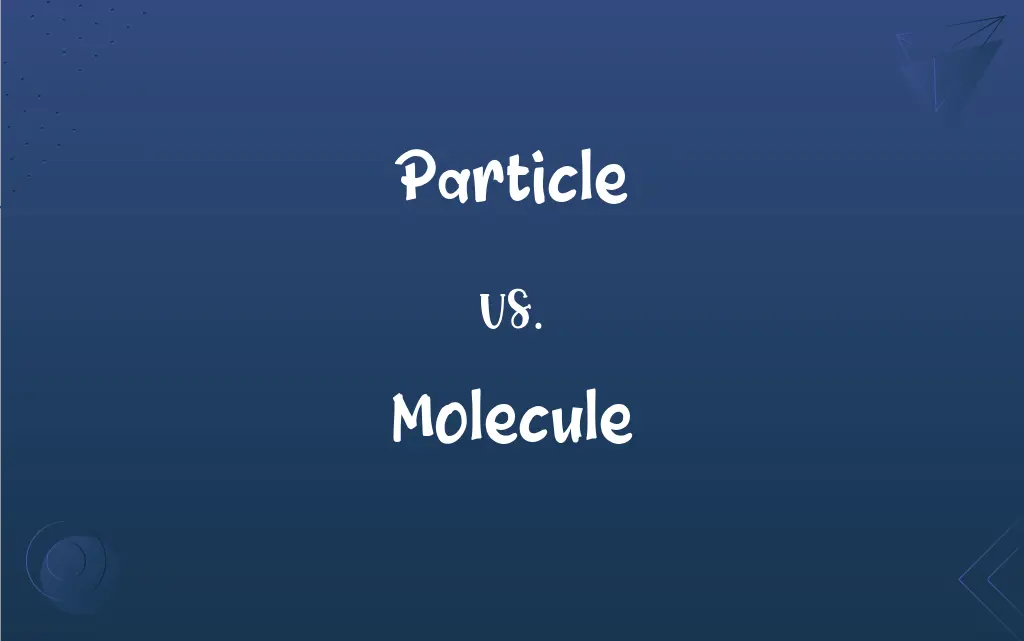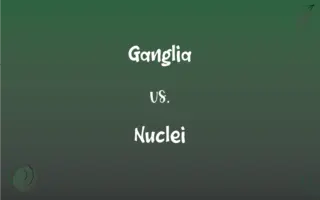Particle vs. Molecule: What's the Difference?
Edited by Aimie Carlson || By Janet White || Published on January 28, 2024
A particle is a general term for a small piece of matter, while a molecule is a specific group of atoms bonded together, representing the smallest fundamental unit of a chemical compound.

Key Differences
A particle is a broad term that can refer to any small piece of matter, atom, or molecule. In contrast, a molecule specifically refers to two or more atoms bonded together, forming the smallest unit of a chemical compound that retains its chemical properties.
Particles can range from subatomic components like electrons and quarks to larger scale like dust or pollen. Molecules, however, are always made of atoms and are larger than individual atoms but still microscopic.
The properties of particles depend on their nature and can be physical (like dust) or subatomic. Molecules have specific chemical properties that define the substances they make up, like water molecules having different properties from oxygen molecules.
In physics, particles are studied in fields like particle physics, which includes elementary particles. In chemistry, molecules are central, with studies focusing on their formation, interactions, and reactions.
Particles are important in various scientific and industrial contexts, such as in air quality or nanotechnology. Molecules are crucial in chemistry and biology, important for understanding reactions, biological processes, and material properties.
ADVERTISEMENT
Comparison Chart
Definition
General term for small bits of matter
Specific group of atoms bonded together
Scale
Can range from subatomic to larger particles
Always microscopic, larger than atoms
Composition
Varies widely (atoms, molecules, other forms)
Made of two or more atoms
Scientific Study
Studied in physics, environmental science
Central to studies in chemistry, biology
Applications
Diverse, from technology to environment
Crucial in understanding chemical substances
ADVERTISEMENT
Particle and Molecule Definitions
Particle
Particles are the subject of study in fields like particle physics.
The particle accelerator helps in understanding the behavior of atomic particles.
Molecule
A group of atoms bonded together, forming the smallest unit of a chemical compound.
A water molecule is made up of two hydrogen atoms and one oxygen atom.
Particle
A small piece of matter, as small as an atom or as large as a speck of dust.
The air was filled with tiny particles of dust.
Molecule
Molecules determine the chemical properties of substances.
The unique arrangement of atoms in a molecule gives each substance its characteristics.
Particle
Environmental science often deals with particles in air and water.
Measuring the particles in the water helped assess its quality.
Molecule
In biology, molecules like DNA are crucial for life processes.
DNA molecules carry the genetic instructions for living organisms.
Particle
In physics, particles can be elementary, like electrons and quarks.
Scientists discovered a new subatomic particle in their experiments.
Molecule
Chemical reactions involve the breaking and forming of molecular bonds.
Photosynthesis involves molecules of carbon dioxide and water transforming into glucose.
Particle
Particles can be visible to the naked eye or microscopic.
Microscopic particles are often involved in chemical reactions.
Molecule
Molecules can be simple like O2 or complex like proteins.
Hemoglobin is a complex protein molecule that carries oxygen in the blood.
Particle
A very small piece or part; a tiny portion or speck.
Molecule
The smallest particle of a substance that retains the chemical and physical properties of the substance and is composed of two or more atoms; a group of like or different atoms held together by chemical forces.
Particle
A very small or the smallest possible amount, trace, or degree
Not a particle of doubt.
FAQs
What is an example of a particle in physics?
An electron is an example of a subatomic particle.
What is a particle?
A particle is a small piece of matter, which can be as small as an atom or larger.
Is a molecule always made of multiple atoms?
Yes, molecules consist of two or more atoms.
What is a complex molecule?
A complex molecule has many atoms and a more complex structure, like DNA.
What determines the properties of a molecule?
The type and arrangement of atoms in the molecule.
Do particles have mass?
Yes, all particles have mass, though it can be extremely small.
What is a molecule?
A molecule is a group of atoms bonded together, the smallest unit of a chemical compound.
Can a particle be a molecule?
Yes, a molecule is a type of particle.
Can particles be seen with the naked eye?
Some can, like dust, but others, like atoms, cannot.
Are all particles in the air harmful?
Not all, but some, like pollutants, can be harmful.
What is a simple molecule?
A simple molecule has few atoms, like oxygen (O2).
What studies particles?
Particle physics and environmental science, among others.
Can molecules be broken down into smaller particles?
Yes, into their constituent atoms.
How do particles affect air quality?
Airborne particles can affect air quality and health, especially smaller, inhalable ones.
How are molecules visualized?
Through techniques like spectroscopy and electron microscopy.
How are molecules related to chemical reactions?
Chemical reactions involve the rearrangement of atoms in molecules.
Are molecules important in biology?
Yes, they are essential for all life processes.
What is an elementary particle?
An elementary particle is a basic constituent of matter, like a quark.
What is the role of molecules in chemistry?
They are the basic units of chemical compounds and reactions.
Are all molecules stable?
No, some are reactive and unstable, depending on their atomic arrangement.
About Author
Written by
Janet WhiteJanet White has been an esteemed writer and blogger for Difference Wiki. Holding a Master's degree in Science and Medical Journalism from the prestigious Boston University, she has consistently demonstrated her expertise and passion for her field. When she's not immersed in her work, Janet relishes her time exercising, delving into a good book, and cherishing moments with friends and family.
Edited by
Aimie CarlsonAimie Carlson, holding a master's degree in English literature, is a fervent English language enthusiast. She lends her writing talents to Difference Wiki, a prominent website that specializes in comparisons, offering readers insightful analyses that both captivate and inform.






































































